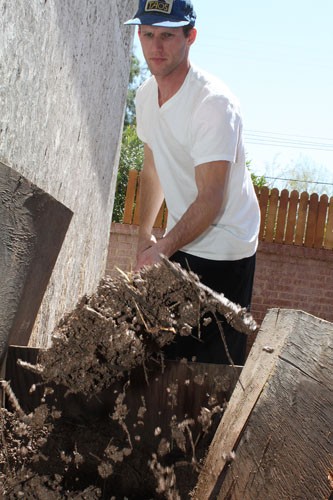Roommates Clayton Stude, Nathan Gloyd and John Lawrence have found a use for the plot of dead grass in their back yard. The three created a 210-square-foot organic garden.
Organic gardening focuses on nourishing plants without the use of harsh chemicals and pesticides. Instead, they use fertilizers like compost and manure.
Stude, a history junior, had the vision of starting the project.
“”My goal from the start was to make my own salsa,”” Stude said.
The roommates first cleared the area and dug about a foot into the ground, creating a garden bed. They then planted seeds in small egg crate containers. After growing seedlings, they transferred the plants into the garden.
Gloyd, a plant sciences senior, found it simple to start the garden.
“”It’s not bad at all. It’s just manual labor,”” Gloyd said.
The garden features plants native to Arizona, including basil, beans, chilies and tomatillos. The roommates plan on planting onions and cilantro in the near future. All of the seeds were purchased from Native Seeds Search.
Native Seeds Search provides a variety of plants, often ancient, that have grown accustomed to Arizona’s climate. By using native seeds, gardeners help keep unique seed lines alive.
Cheralyn Schmidt, program coordinator for the UA Cooperative Extension, explained that native seeds are not only easily grown in Tucson’s arid climate, but are more sustainable.
“”They don’t require as much water,”” Schmidt said. “”They flourish in our soil.””
Home gardens, especially organic gardens, benefit the environment in several ways.
“”Every plant that you grow not only feeds you but is putting off oxygen all the time,”” Schmidt said. “”Everything you grow in your backyard without spray is one less sprayed thing in the grocery store.””
The roommates have found the garden to be a lesson in sustainability. They now have a greater appreciation for the effort it takes to produce food.
“”I think it’s really important that people are able to grow their own food,”” Gloyd said. “”It gives you a better respect and understanding of where your food comes from.””
The garden, which was started in mid-January, requires daily weeding and watering. Stude expects that the plants will be ready for harvest by the summer.
“”It really is a simple thing to do,”” Stude said of maintaining the garden.
The roommates have also found the project to be a bonding experience and look forward to the results.
“”We’ve had a great time. It’s fun hanging out in the backyard, putting music on and getting our hands dirty,”” Stude said.
Lawrence, who graduated from the UA in December, echoed the sentiment.
“”I’m looking forward to being able to go outside, get fresh cilantro, and cook with it,”” he added.
In another effort to be eco-friendly, the roommates have also started a compost bin. They compost food scraps like fruit rinds, vegetable peels, eggshells and coffee grounds in their kitchen. They then transfer the scraps to a large bin outside and add sticks, leaves and water. Once the compost is ready, it is used as topsoil for the garden.
Schmidt recommends composting as an easy way to reduce waste and as a cost-effective way to nourish plants.
“”If you’re using actual waste from your house, it costs you nothing, and you have premium nutrition,”” Shmidt said.
Joe Abraham, coordinator of the Campus Sustainability Committee, sees the UA community becoming interested in sustainability both on and off campus.
“”I think the university community is absolutely engaged in sustainability,”” Abraham said. “”It’s a very popular issue here, and people are energized about it.””
Getting involved: For students interested in gardening specifically: visit the master gardeners at the UA Extension. There, students can visit demonstration gardens and speak with volunteers about planting and composting.









